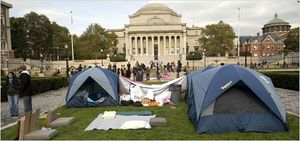2007 hunger strike
| This article documents a current event. Its contents are subject to rapid change. |

In November 2007, Columbia activists embarked upon yet another protest. Banking off several recent "bias incidents" involving racist and anti-Semitic symbols seen around campus, a group of students has gone on a hunger strike, and lassoed some vague and general demands into an agenda they hope they will coerce the administration into accepting.
Contents
General focus areas of demands
- Administrative reform
- Further expansion of Ethnic Studies
- No expansion into Harlem (see Manhattanville expansion)
- Core Curriculum reform
Participants
- Bryan Mercer, 22, a senior at Columbia
- Samantha Barron, 19, Barnard sophomore from California
- Aretha Choi, 19, a Barnard sophomore from Colorado (dropped out on 11/11)
- Emilie Rosenblatt, 22, a Columbia senior from Illinois
- Victoria Ruiz, 20, a Columbia junior from California
- Rich Brown, a Columbia junior (joined on 11/13)
- April Simpson, a Columbia freshman (joined on 11/13)
Reactions
Support
Lucha, the MSA, the College Democrats, SEEJ, and the ISO are among student groups offering support. The CCSC, GSSC, and Barnard's SGA have offered "statements of solidarity".
The strikers are also supported by some members of the faculty, notably Hamid Dabashi, Gil Anidjar, Nicholas De Genova, and Barnard PoliSci prof Dennis Dalton, who declared he would join the strike, but continues to consume water and juice. The entire faculty of the Center for the Study of Ethnicity and Race has also declared support.
Alumni who have visibly supported the strike include the hunger strikers of 1996, Mark Rudd, Jennifer Oki, Nell Geiser, and Alexis Pauline Gumbs. Anti-Columbia singer Nellie McKay is also an active supporter.
Opposition
The ESC is the only student group to officially oppose the strike so far. A Spec poll found that 75% of the student body does not support the strike.
In a published report in Spec on November 15, Dean of Student Affairs Chris Colombo reportedly told CCSC President Michelle Diamond that the strike "is going to end one way or another tonight." Diamond subsequently issued a statement of her own, independent of the student government, asking for the strike to end.
As of November 15, at least two strikers are in danger of a forced medical withdrawal from the university given their deteriorating conditions.
Timeline
- November 7: Strike begins, tents erected on Butler Plaza. In the evening, Christmas lights are displayed along fencing of the lawn. It is unclear whether or not the strikers received permission to use university electricity.
- November 11: Aretha Choi, battler of an eating disorder, drops out after she is found nonresponsive in 209 Butler and subsequently rushed to St. Lukes Hospital.
- November 14: At approximately 10:15 in the evening, Sam Rennebohm, a member of the ad hoc coalition in support of the strikers, surrounded by a crowd of approximately 200 supporters and onlookers, declares that on November 15 at noon, students will demonstrate to prevent events from taking placed as scheduled at the university, including an alumni dinner with former UN Secretary General Kofi Annan. Negotiations with the administration have come to a stand-still with no new meetings scheduled. Shortly thereafter, a Spec reports that a number of the strikers demands have been met.
Achievements
Columbia College dean Austin Quigley and Arts and Sciences VP Nicholas Dirks have tried to preempt the strike with announcements they're willing to make new administrative hires to represent diversity concerns, and have pledged further study regarding the status of the Core Curriculum. The Manhattanville expansion is so far not under negotiation.
On Novemember 14, Spec reported that the strikers had won the inclusion of a major cultures seminar to become part of the Columbia College core curriculum, transforming the existing major cultures core requirement.